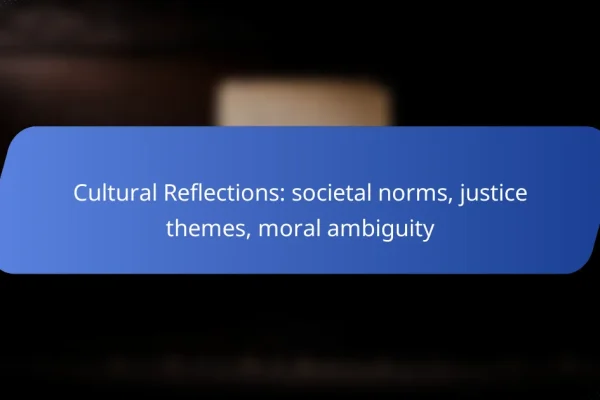What are the best revenge films to watch in Canada?
Some of the best revenge films to watch in Canada include a mix of international classics and contemporary hits. These films often explore themes of justice, vengeance, and moral ambiguity, making them compelling choices for viewers seeking intense narratives.
Oldboy (2003)
“Oldboy” is a South Korean neo-noir action thriller that follows the story of Oh Dae-su, who is inexplicably imprisoned for 15 years. Upon his release, he seeks revenge on his captor while uncovering the mystery behind his imprisonment. The film is known for its shocking twists and a gripping narrative that keeps viewers on the edge of their seats.
This film is a prime example of how revenge can lead to unexpected consequences, emphasizing the psychological toll of vengeance. Its unique storytelling and stylistic cinematography have earned it a cult following, making it a must-watch for fans of the genre.
Kill Bill: Vol. 1 (2003)
Quentin Tarantino’s “Kill Bill: Vol. 1” follows the story of The Bride, who seeks revenge on her former associates after they betray her. The film is characterized by its stylized action sequences and homage to various film genres, including martial arts and spaghetti westerns. The vibrant visuals and strong performances, particularly by Uma Thurman, make it a standout in the revenge film category.
The film’s blend of humor and violence, along with its memorable soundtrack, creates a unique viewing experience. It’s a great choice for those who appreciate a mix of action and storytelling in their revenge narratives.
The Revenant (2015)
“The Revenant” tells the harrowing tale of frontiersman Hugh Glass, who is left for dead after a bear attack and embarks on a quest for revenge against those who abandoned him. This film is notable for its stunning cinematography and intense performances, particularly by Leonardo DiCaprio.
The themes of survival and vengeance are intricately woven into the narrative, showcasing the lengths one will go to for revenge. Its historical context and raw portrayal of the wilderness add depth to the story, making it a powerful viewing experience.
John Wick (2014)
“John Wick” features a retired hitman seeking vengeance for the death of his beloved dog, a final gift from his deceased wife. The film is renowned for its stylish action sequences and world-building, introducing viewers to a hidden society of assassins. Keanu Reeves’ portrayal of the titular character has become iconic, celebrated for its intensity and depth.
This film revitalized the action genre with its choreography and unique approach to storytelling. It serves as a reminder of how personal loss can ignite a quest for revenge, leading to a relentless pursuit of justice.
Dead Man’s Shoes (2004)
“Dead Man’s Shoes” is a British psychological thriller that follows Richard, a soldier who returns to his hometown to exact revenge on a group of local bullies who tormented his mentally disabled brother. The film is grounded in realism, exploring the emotional and psychological aspects of revenge.
Its raw and gritty portrayal of violence and retribution makes it a thought-provoking watch. The film challenges viewers to consider the moral implications of revenge and the impact it has on both the avenger and the victim.
How do revenge films impact viewers?
Revenge films significantly impact viewers by evoking strong emotional responses and prompting reflections on morality. These films often engage audiences through intense narratives that explore themes of justice, vengeance, and human emotion.
Emotional catharsis
Revenge films provide emotional catharsis by allowing viewers to experience and release pent-up feelings of anger and frustration. The intense storylines often resonate with personal experiences, enabling audiences to confront their own emotions in a safe environment.
This form of emotional release can be beneficial, as it may lead to a sense of relief or clarity. However, viewers should be cautious of becoming desensitized to violence or developing unhealthy coping mechanisms as a result of this cathartic experience.
Morality exploration
These films often delve into complex moral questions, challenging viewers to consider the implications of revenge. By presenting characters who seek vengeance, the narratives prompt discussions about justice, ethics, and the consequences of one’s actions.
Viewers may find themselves questioning their own beliefs about right and wrong, which can lead to deeper self-reflection. Engaging with these moral dilemmas can be enlightening, but it is essential to approach them critically to avoid glorifying violence.
Empathy and identification
Revenge films can foster empathy by allowing viewers to identify with the protagonists’ struggles and motivations. As audiences witness the characters’ pain and desire for retribution, they may develop a deeper understanding of the emotional complexities involved in seeking revenge.
This identification can enhance emotional engagement with the story, making the viewing experience more impactful. However, it’s important for viewers to maintain a balance and not lose sight of the distinction between fiction and reality, as excessive identification may skew their perceptions of real-life conflicts.
What themes are common in revenge films?
Revenge films often explore themes of justice, morality, and the psychological impact of vengeance. These narratives typically delve into the complexities of seeking retribution and the emotional turmoil that accompanies such actions.
Justice vs. vengeance
The distinction between justice and vengeance is a central theme in many revenge films. Justice is often portrayed as a societal or legal response to wrongdoing, while vengeance is a personal, often impulsive reaction. Characters may struggle with these concepts, questioning whether their actions are justified or merely a quest for personal satisfaction.
For example, a character seeking justice might pursue legal avenues, while another may take matters into their own hands, leading to moral dilemmas and conflicts. This tension raises questions about the true nature of justice and its effectiveness compared to personal retribution.
Isolation and suffering
Isolation and suffering are frequently depicted in revenge narratives, highlighting the emotional toll of seeking vengeance. Characters often find themselves alienated from friends and family as their quest for revenge consumes them. This isolation can lead to increased suffering, both physically and emotionally.
In many cases, the protagonist’s journey is marked by loneliness, as they become increasingly fixated on their goal, losing sight of their relationships and well-being. This theme serves to illustrate the destructive nature of revenge, suggesting that the pursuit of vengeance can lead to profound personal loss.
Consequences of revenge
The consequences of revenge are a critical aspect of these films, often illustrating that the pursuit of vengeance can lead to unforeseen repercussions. Characters may achieve their goal but at a significant cost, such as loss of life, legal consequences, or irreversible damage to their own psyche.
For instance, a character who successfully avenges a loved one may find themselves haunted by guilt or regret, questioning whether their actions were worth the price paid. This theme serves as a cautionary tale about the cycle of violence and the potential for revenge to perpetuate further suffering.
What are the characteristics of a successful revenge film?
A successful revenge film typically features a compelling narrative that focuses on themes of justice and retribution. Key characteristics include strong character development, engaging plot twists, and high stakes that keep the audience invested in the protagonist’s journey.
Strong character development
Strong character development is essential in revenge films, as viewers need to connect with the protagonist’s motivations and struggles. A well-crafted backstory can provide context for the character’s actions, making their quest for vengeance relatable and emotionally charged.
For example, a character who has suffered a personal loss often garners sympathy, allowing the audience to root for their success. This emotional investment is crucial for maintaining engagement throughout the film.
Engaging plot twists
Engaging plot twists are a hallmark of successful revenge films, as they keep the narrative unpredictable and exciting. These twists can involve unexpected betrayals, revelations about the antagonist, or shifts in the protagonist’s moral compass.
Incorporating twists not only enhances the storyline but also challenges the viewer’s assumptions, making the experience more immersive. A well-timed twist can elevate the stakes and deepen the emotional impact of the film.
High stakes
High stakes are vital in revenge films, as they create tension and urgency in the protagonist’s quest. The consequences of failure should feel significant, whether it’s personal loss, legal repercussions, or moral dilemmas.
For instance, a character seeking revenge may risk their relationships, freedom, or even their life, which amplifies the emotional weight of their actions. Establishing these high stakes early on helps to maintain suspense and keeps the audience invested in the outcome.
How do cultural differences influence revenge films?
Cultural differences significantly shape the themes, narratives, and character motivations in revenge films. These variations reflect distinct societal values, historical contexts, and storytelling traditions that resonate with audiences in different regions.
Regional storytelling styles
Regional storytelling styles affect how revenge is portrayed in films. For instance, Western revenge films often emphasize individualism and personal justice, while Asian cinema may incorporate collective themes and familial honor. This leads to diverse narrative structures, such as the linear progression of revenge in Hollywood versus the more cyclical or philosophical approaches seen in some Asian films.
Additionally, the pacing and tone can vary widely. In some cultures, revenge narratives may unfold slowly, allowing for character development and moral dilemmas, while others might focus on fast-paced action and immediate gratification.
Societal values and norms
Societal values and norms play a crucial role in shaping the motivations behind revenge. In cultures where honor and reputation are paramount, revenge may be depicted as a necessary response to wrongdoing, reinforcing social codes. Conversely, in societies that prioritize forgiveness and rehabilitation, revenge films might explore the consequences of vengeance, highlighting its futility.
Moreover, the portrayal of justice systems can differ. In some regions, revenge films may critique legal inadequacies, prompting characters to take justice into their own hands, while in others, they may promote the idea that lawful retribution is the ultimate resolution.















